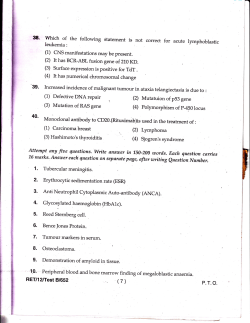
13 11 20 Call us What is cancer?
Call us 13 11 20 What is cancer? Cancer is a disease of the cells, which are the body’s basic building blocks. The body constantly makes new cells to help us grow, replace worn-out tissue and to heal injuries. Normally cells multiply and die in an orderly way. Sometimes cells don't grow, divide and die in the usual way. This may cause blood or lymph fluid in the body to become abnormal or form a lump called a tumour. A tumour can be benign or malignant. Benign tumo ur – cells are confined to one area and are not able to spread to other parts of the body. This is not cancer. Malignant tumo ur – is made up of cancerous cells which have the ability to spread by travelling through the bloodstream or lymphatic system (lymph fluid). The cancer that first develops in a tissue or organ is called the primary cancer. A malignant tumour is usually named after the organ or type of cell affected. A malignant tumour that has not spread to other parts of the body is called localised cancer. A tumour may invade deeper into surrounding tissue and can grow its own blood vessels (angiogenesis). If cancerous cells grow and form another tumour at a new site, it is called a secondary cancer or metastasis. A metastasis keeps the name of the original cancer. For example, breast cancer that has spread to the lungs is called metastatic breast cancer even though the person may be experiencing symptoms caused by problems in the lungs. Content printed from http://www.cancersa.org.au/information/a-z-index/what-is-cancer This website is made possible by the generous support of South Australians. Copyright © 2010-2014 Cancer Council SA
© Copyright 2025





















